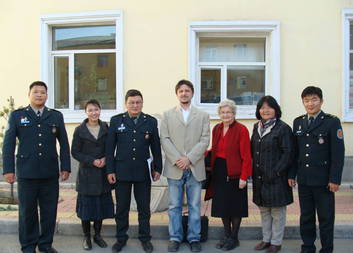During the fall of 2012 Caritas Czech Republic began this project, which aims to humanize the conditions in Mongolian detention centres. Our project is inspired and builds on the success of previous projects in Mongolia, where Caritas CR has been developing the system of social work and education. The new project is co-financed by the EU.
Social work with the condemned within Mongolian prison system, which counts 24 prisons with approximately 6 000 prisoners, is a relatively new undertaking. Since 2003, there are 78 social workers currently working within the prison system (Court Decision Enforcement Administration). They were hired after numerous complaints about the situation in correctional centres have been raised. The social workers are insufficiently qualified to provide real social work with the prisoners. As a result of that there is an increased risk of inhumane treatment for prisoners and thus the absence of systematic and effective preparation for their return into the society. This is proven by the increased rate of relapse, too.
The Prison Service has therefore prepared and has begun to implement the plan to increase the professional knowledge of social workers and to improve overall conditions in prisons. In 2011, its leaders contacted Caritas CR office in Ulaanbaatar and asked for cooperation during the realization of the plan. They chose Caritas CR, because it had already worked in the area of education of social workers in the past.
Caritas CR prepared the project, whose goal is to solve the problems mentioned above. That is why Caritas asked for European Union funding. Beside the prison service there were also other organizations helping with the preparation of the project, especially the non-governmental organization Prison Fellowship of Mongolia (which has been working in local jails since 1998) and the Mongolian University of Science and Technology (which offers courses of social work). The project will include more non-governmental human rights organizations.
Experts will create training modules for social workers in correctional institutions, which will be partially based on Czech experiences. Trainers will later teach social workers, who work in the prison service. Training modules will be given to the Mongolian University Science and Technology, which will use them to improve prison social workers’ qualifications in the future. Within the project, mapping of compliance/violation of human rights will take place in the prisons and the system of providing legal advice to convicted persons will be created.
On the photo: Representatives of the Court Decision Enforcement Administration, Head of the Mission of Caritas CR (center) and a representative of the Deputy Prison Fellowship partner organizations of Mongolia







